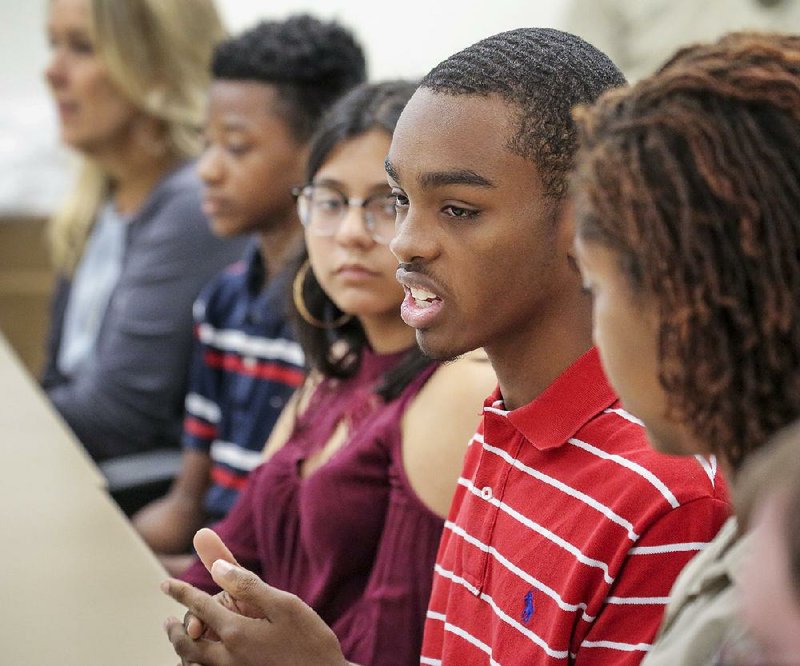During routine active-shooter drills -- sometimes called "intruder" drills -- students lock the doors, turn out the lights and hide from an imagined assailant.
But despite their preparations for worst-case scenarios, Little Rock Central High School and Mabelvale Middle School students and teachers told a meeting of the Arkansas School Safety Commission on Tuesday that they largely feel safe in their Little Rock district schools, especially when they're able to see their campuses taking steps to ensure student security.
"As a student at Central High School, I feel comfortable because of the student body," senior Adaja Cooper, 17, told the commission, mentioning the way students share information about perceived threats on social media. "[And] knowing that my school is acknowledging what's going on and what we should do about it ... it makes me a lot more comfortable."
Tuesday marked the first presentation by students at a meeting of the commission, which was assembled by Gov. Asa Hutchinson in March to study school safety. The 18-member body comprising education, law enforcement and mental-health professionals was put together in the wake of the shooting that killed 17 people at Marjory Stoneman Douglas High School in Parkland, Fla.; the group is preparing to submit a final report to Hutchinson's office in November.
At the student presentation, which was not attended by all members of the group, the commission heard input by Bryahna Garcia and Durell Shaw, both 13, from Mabelvale, and from Central's Cooper and Tommy "Chase" Sproles, 17. The commission also received insight from teachers Fran Moseley and Scott Hairston.
Those presentations offered perspective from young people who have become accustomed to preparing for disasters: tornadoes, gun violence and school shootings. And they offered a look at the world through the eyes of students who balance their personal sense of familiarity and comfort in their schools with visible markers of security threats and violence.
Some of those markers include school resource officers, who are armed law enforcement officers who work on campuses. According to the Little Rock School District, there are two working at Central and one at Mabelvale, and students said their presence on campus could be reassuring.
"From the outside looking in, they do give off an intimidating persona," but that could be part of their effectiveness as a deterrent, Sproles said. "Instead of, like, having the teachers with firearms ... there's actually a person there who's qualified."
But the Central students expressed unease about situations in which school resource officers could become involved with regular disciplinary activities at the school, with Sproles calling it a "thin line."
"It's unsettling to see kids my age walking away in handcuffs," Cooper said. "We are still kids; we're still in high school."
Appearing before the commission, students also wrestled with the visibility of Central, which was the site of the 1957 desegregation crisis and now is registered as a national historic site. The school has a high profile and often hosts tours and visitors.
"If someone were to attack Central or want to say a message or something about the school, that's an actual possibility," Sproles said.
Commission members questioned students about how they would report threats (mostly to their teachers and administrators, rather than school resource officers, students said), and also asked several questions regarding how effective they thought drills for school shootings could be.
All the students said they had been undergoing drills of various kinds for much of their lives, but some wondered about the realism of those situations -- and about inconsistencies in the drill process.
"If a student were to be the shooter, they would know the drill for that," Garcia pointed out.
Teachers also shared mixed feelings about drills. Moseley, who has taught at Mabelvale for 25 years, said students who had been present during a recent incident at War Memorial Stadium in which a crowd panicked after apparently false reports of gunshots told her they did exactly what they had been taught to do during the drills -- "[They] got down, [they] got under something."
But Hairston, an English teacher at Central, said some teachers there feel that active-shooter simulations are "unrealistic" and "one-dimensional."
"It seems kind of farcical," he said. "We're in a corner of our rooms with the lights off. ... It just kind of seems like we're sitting ducks, and why aren't we practicing other things?"
The student presenters stopped short of making specific recommendations to the commission, and they mostly did not address the bulk of the recommendations the group made in a preliminary report released in June.
That report, which is not binding, suggested some form of armed security at schools at all times when students and teachers are present. It also made recommendations for expanded mental-health services, new emergency communication systems and behavioral threat-assessment teams.
Tuesday's meeting appeared to be more of a listening session for the commission, which heard students' and teachers' matter-of-fact approach to violence in schools.
For them, school shootings seemed to be an unlikely -- but possible -- fact of life.
During a break in the meeting, commission head and University of Arkansas System Criminal Justice Institute director Cheryl May said she found the students "extremely bright" and "very knowledgeable. ... I think their perspective is extremely valuable," she said.
She wasn't sure how feedback received Tuesday would affect the commission's work on its report, although she said she was encouraged to hear that all the students present do, in fact, feel safe in their schools.
This was probably the last opportunity for formal input from students, she said, as the commission is approaching its November deadline.
Metro on 09/12/2018
